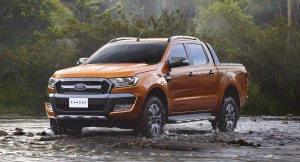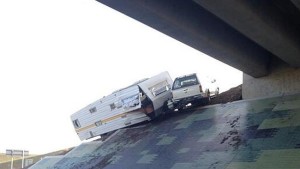Can I really tow a 3500kg Caravan?
This is another hotly contested argument around the caravanning forums and facebook pages and it’s easy to understand why. So many people go out and buy a new 4wd believing all the advertising hype and not considering the full picture. Apart from being confusing, the issue is confronting and I believe a huge percentage of owners out there have realised they have made a very expensive mistake and will look for any argument or justification they can to convince themselves, and anyone else who will listen, the opposite is true.
 Take the Ford Ranger as an example. Ford make a lot of song and dance about its towing credentials and how it is capable of towing up to 3500kgs. This is extremely tempting to many caravanners as weight is a huge issue and we are all looking for the ability to carry the maximum we can on our adventures. It also means there is a less expensive option to the all-conquering 200 series Landcruiser that has a dealer service network as extensive as Toyota’s.
Take the Ford Ranger as an example. Ford make a lot of song and dance about its towing credentials and how it is capable of towing up to 3500kgs. This is extremely tempting to many caravanners as weight is a huge issue and we are all looking for the ability to carry the maximum we can on our adventures. It also means there is a less expensive option to the all-conquering 200 series Landcruiser that has a dealer service network as extensive as Toyota’s.
But there’s a problem. The Ranger has a gross combined mass of 6000kgs. That means the combined weight of the Ranger and its trailer cannot exceed 6000kgs. Ford quote the kerb mass of the top of the range diesel model with automatic transmission as being 2289kgs with a full fuel load. So to calculate how much extra gear you can put into the Ranger while it’s towing a 3500kg van, we subtract the kerb weight of the Ranger, and the maximum loaded weight of the van from the GCM. ie: 6000 – 3500 – 2289 = 211kg payload capacity. That’s not a lot when you consider that with 2 passengers on board weighing 80kgs each (160kg in total) leaves 51kg remaining. Now you have to add the weight of the tow hitch, the gooseneck and a weight distribution hitch which will weigh at least 40kgs in total and you’re left with 11kgs for everything else. You can forget a bull bar, big LED light bars or a second battery. In fact there’s barely enough for the two of you to wear cloths, have a CB radio and a small car fridge with a couple of cans of drink.
The situation is not unique to the Ford Ranger. The same can be said for a great many other popular tow vehicles on the market today.
However I believe there is another way to look at this issue that may assist people who find themselves in this situation.
Having a caravan that can be loaded up to a total weight of 3500kgs doesn’t mean you have to load it up that much. It may have a tare or empty weight of only 2500kgs. If you redistribute your total load between the car and the van, you may be able to carry everything you need and not exceed any limits.
Again…looking at the Ranger, with a GCM of 6000kg, take away the kerb weight of the car and the tare or empty weight of the van to end up with the total payload that can be distributed across the pair. ie: 6000 – 2289 – 2500 = 1,200kg payload. By putting some of that load in your ute and less in the van you may be able to partially resolve the issue remembering to ensure you do not exceed the gross vehicle mass or any axel load limits on the tow vehicle in the process. Getting a lesser specified model and/or a GVM upgrade will also assist with redistributing the load although, keep in mind, neither of these options will increase your GCM.
Lastly, even if you do resolve your weight issue, or if you choose to ignore it as many appear to do, you may want to ask yourself the question of whether or not you should actually tow that heavy a weight in the first place.
There is a lot of discussion about how heavy the tow vehicle should be in relation to the weight of the trailer. The old tail wagging the dog argument. There is some anecdotal evidence to suggest that dual cab utes are involved in more car/caravan rollovers than larger 4WD wagons. I cannot say whether this is true or not as there is not a lot of hard evidence to support this. However I do believe the more weight you can put into the tow vehicle relative to the caravan will result in a more confidant towing experience.
trailer. The old tail wagging the dog argument. There is some anecdotal evidence to suggest that dual cab utes are involved in more car/caravan rollovers than larger 4WD wagons. I cannot say whether this is true or not as there is not a lot of hard evidence to support this. However I do believe the more weight you can put into the tow vehicle relative to the caravan will result in a more confidant towing experience.

